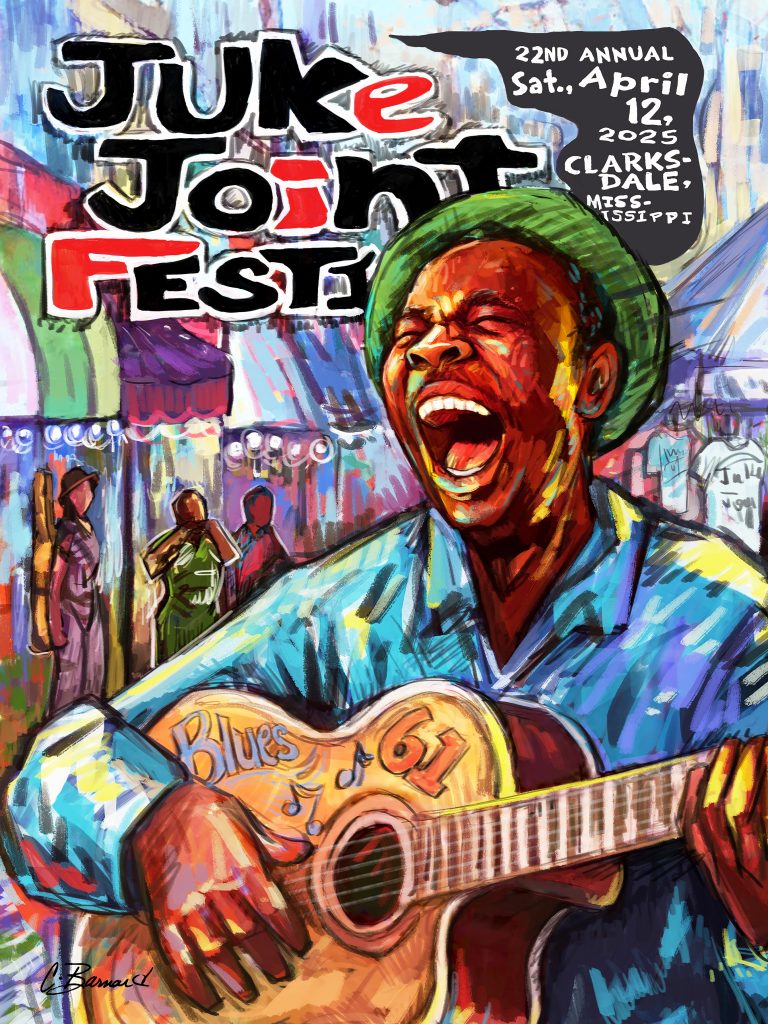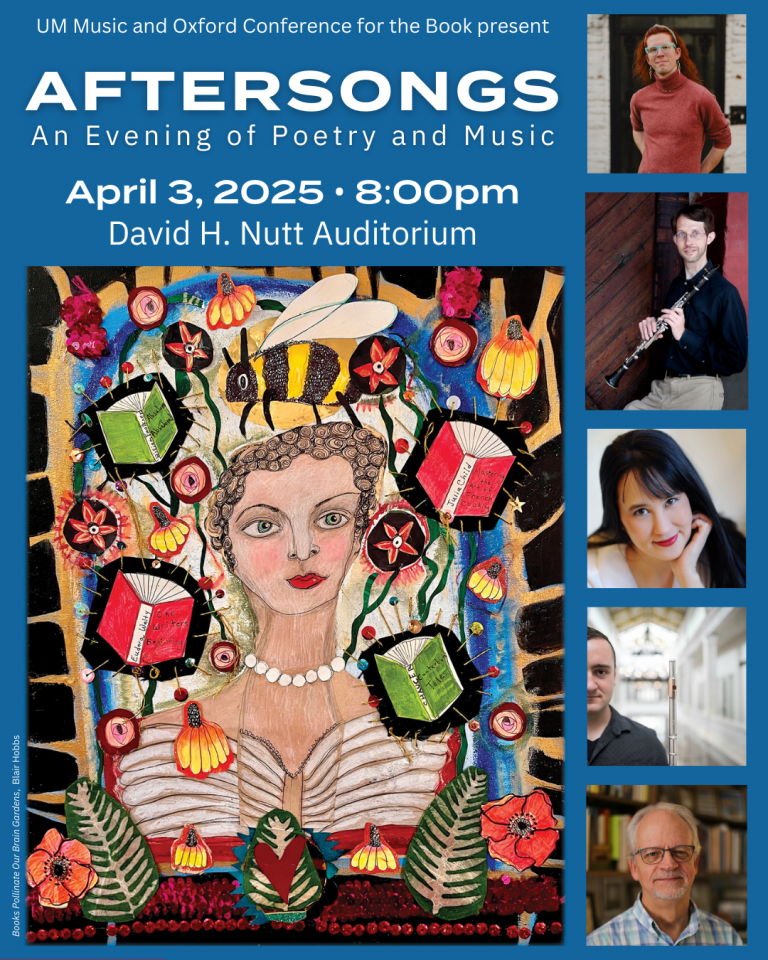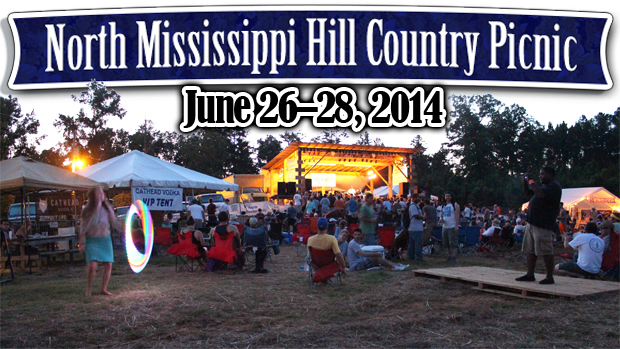
by Suanne Strider
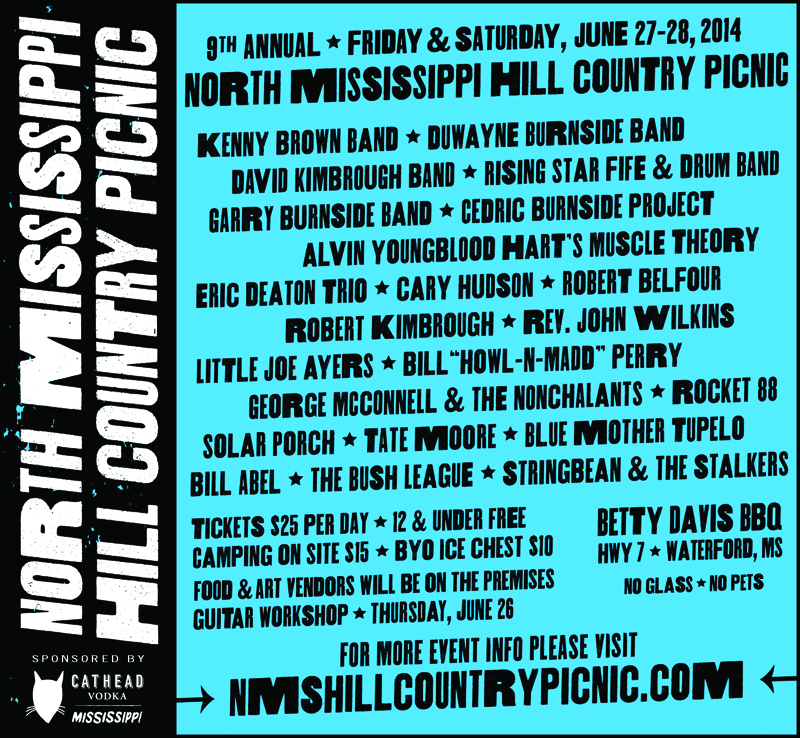 Malone, Miss. (TLV) – The North Mississippi Hill Country Picnic, now in its 9th year, honors a long tradition of community and family gathering that has its beginnings in the culturally rich traditions of the African American community of North Mississippi. Kenny Brown, co-founder of the festival with wife Sara Brown and also one of the featured performers, puts on the festival every year to give the public an idea of what it is like to attend a traditional family get-together like the ones that have been held for years by many of the North Mississippi Hill Country blues men’s families.
Malone, Miss. (TLV) – The North Mississippi Hill Country Picnic, now in its 9th year, honors a long tradition of community and family gathering that has its beginnings in the culturally rich traditions of the African American community of North Mississippi. Kenny Brown, co-founder of the festival with wife Sara Brown and also one of the featured performers, puts on the festival every year to give the public an idea of what it is like to attend a traditional family get-together like the ones that have been held for years by many of the North Mississippi Hill Country blues men’s families.
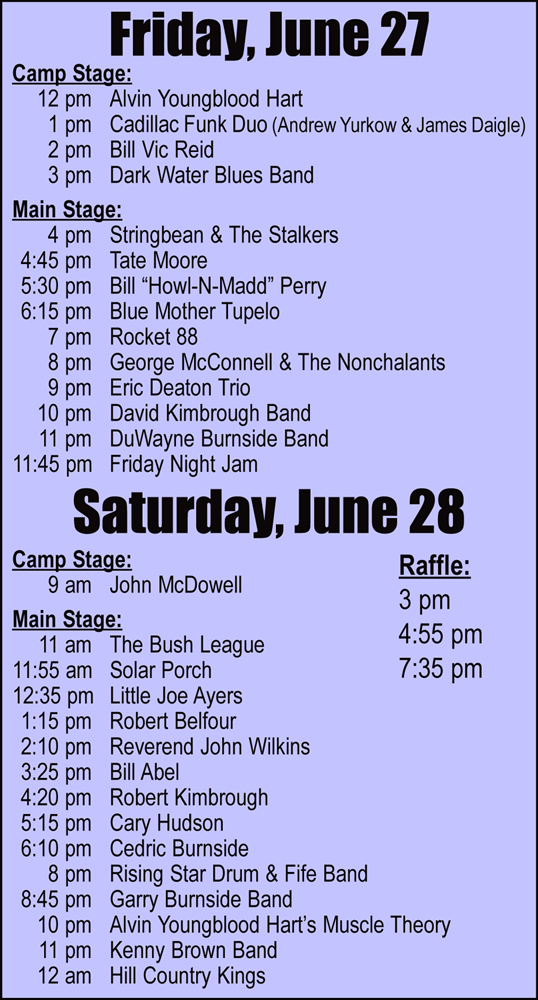 R.L. Burnside is perhaps the most famous of all of the Hill Country bluesmen, and has been a direct influence on bands such as The Black Keys and Keb’ Mo’. He had a large and direct influence on Kenny Brown, and Kenny became one of Burnside’s lifelong friends and band mates. The Burnside family is also well-known for their family picnics where the family congregates on Sundays to cook and play music—and the tradition continues to this day. Three of R.L.’s musical offspring are featured at this year’s Hill Country Picnic—his sons Duwayne and Garry Burnside, and his grandson Cedric Burnside. And if you count Kenny Brown, (which you should—R.L. referred to him lovingly as his “adopted white son”), that makes four.
R.L. Burnside is perhaps the most famous of all of the Hill Country bluesmen, and has been a direct influence on bands such as The Black Keys and Keb’ Mo’. He had a large and direct influence on Kenny Brown, and Kenny became one of Burnside’s lifelong friends and band mates. The Burnside family is also well-known for their family picnics where the family congregates on Sundays to cook and play music—and the tradition continues to this day. Three of R.L.’s musical offspring are featured at this year’s Hill Country Picnic—his sons Duwayne and Garry Burnside, and his grandson Cedric Burnside. And if you count Kenny Brown, (which you should—R.L. referred to him lovingly as his “adopted white son”), that makes four.
Junior Kimbrough is also among the all-star list of Hill Country bluesmen who helped teach Kenny Brown to become the skilled musician he is today. Brown played many times with Kimbrough and his family throughout the years. David Kimbrough III, son to Junior Kimbrough, and his band will be playing the festival on Friday, continuing with the family theme prevalent throughout the lineup. And Robert Kimbrough, another son of Jr., will take to the stage on Saturday afternoon.
Otha Turner also appears on the list of bluesmen directly attributed to creating the definitive sound of the Hill Country Blues. Otha Turner passed away in 2003, but, as with Burnside and Kimbrough, Turner’s legacy and art are carried on by his descendants in the form of The Rising Star Fife & Drum Band, who are also part of this year’s music lineup.
Sara Brown is co-creator and organizer of the event. I spoke with her recently about the rising worldwide popularity of the Picnic. She told me of two international events that have been influenced by Hill Country Blues. One came about after Swiss tourists attended the picnic and subsequently decided to create an event in their own country like what they had experienced at Potts Camp. Their festival, The Blues Rules Crissier Festival, “When the Mississippi River meets the Leman Lake,” held in Laussane, Switzerland, just wrapped up its 5th year (www.blues-rules.com). The second is the Åmål Blues Festival in Åmål, Sweden, which was founded in 1992, Sara said, “after the organizers met Kenny at the King Biscuit Festival about 30 years ago and decided to go home and start a festival—Hill Country inspired. Amal has been a big support of the Picnic since [it] began.” (www.bluesfest.net)
If the great atmosphere, culture, and music aren’t enough, there is yet another reason to attend this year’s picnic. The BBC will be filming in preparation for a documentary set to be released sometime in 2015. For those of you who have yet to get your full fifteen minutes of fame, here’s your chance to get a few minutes in.
The NMSHCP is not only a great time with great music and community; it is also for a great cause. The Picnic is a fully registered 501(C) 3 non-profit organization, and, as stated in their mission statement, was “created to enhance appreciation and educate the general public about the native art form of North Mississippi Hill Country Blues music—through performance, preservation, and interpretation. When you attend the event, you are supporting the mission of [the] organization.”
Read on for a complete listing of the artists performing at this year’s picnic, as well as raffle announcement times and more information about the charity. You must be present to win. For those attending the festival, I encourage you to participate in the raffle. The funds required to cover the cost of this year’s cause is quite costly—therefore much participation is needed to accomplish the goal of this honorable act of charity. If you are not attending, you may contribute by contacting Sara Brown at the following e-mail address: nmshillcountrypicnic@gmail.com .
The 9th Annual North Mississippi Hill Country Picnic will kick off Thursday, June 26 with a guitar workshop taught by four guitarists with top billing on this year’s music lineup. Special tickets for this event must be purchased in advance online at www.nmshillcountrypicnic.com. The event will be held at Alice Mae’s Café in Holly Springs, Mississippi (115 North Center St.) from 10 am until 3 pm, and is open to ticketholders of all ages. Duwayne Burnside will be hosting, and the special guest artists teaching the workshop are Garry Burnside, Eric Deaton, Cary Hudson, and Bill Abel. A jam session featuring the instructors will follow the workshop, and barbeque, fish, and cold beverages will be available for purchase.
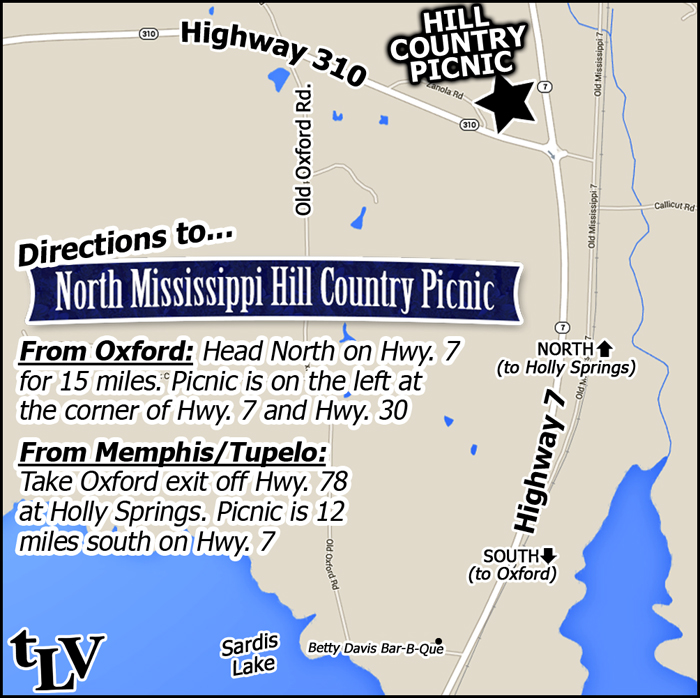 The festival gates will open at 5 pm on Thursday, and tickets will be available at the door for cash only (or you can preorder tickets online at www.nmshillcountrypicnic.com). The event is located halfway between Holly Springs and Oxford, Miss., and is hosted by the world-famous Betty Davis Bar-B-Que. Primitive camping is available from Thursday – Saturday on a first-come, first-served basis. For people preferring to stay in a hotel, there is a self-schedule shuttle service available running both to and from Oxford and Holly Springs, for $10 one-way.
The festival gates will open at 5 pm on Thursday, and tickets will be available at the door for cash only (or you can preorder tickets online at www.nmshillcountrypicnic.com). The event is located halfway between Holly Springs and Oxford, Miss., and is hosted by the world-famous Betty Davis Bar-B-Que. Primitive camping is available from Thursday – Saturday on a first-come, first-served basis. For people preferring to stay in a hotel, there is a self-schedule shuttle service available running both to and from Oxford and Holly Springs, for $10 one-way.
Coolers are allowed for a small fee, and you are welcome to bring your own food, although there will be food vendors on site serving traditional Mississippi staples such as barbeque and fried catfish, among other things. There will also be an artists’ village set up for festival-goers interested in hand crafted jewelry, clothing, and other wares.
A raffle booth will be set up Friday and Saturday where festival-goers may buy chances to win an “eclectic assortment of goods” donated by private parties for the event. The proceeds will help fund a local cause pertaining to the Mississippi Blues community. Last year’s proceeds went toward the cost of Delta Blues man T-Model Ford’s needs. This year the proceeds will be used to place headstones on the graves of R.L. Burnside’s wife of fifty-nine years, Alice Mae; his son R.L. Junior; his daughter Mildred; and his grandson Cody Burnside.
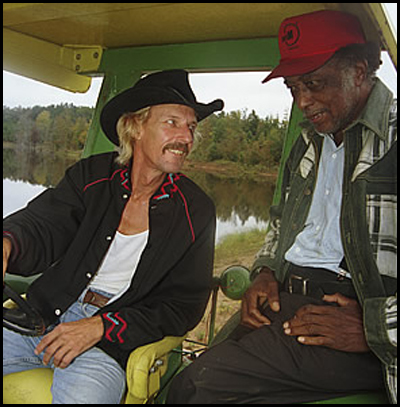 If it weren’t for Kenny Brown and his wife Sara, there would never have been a North Mississippi Hill Country Picnic. Kenny, blessed to have been mentored by the greatest bluesmen of North Mississippi in his time, was determined to continue the tradition as he had experienced it. They started the picnic with the intent to preserve the magical, legendary musical get-togethers held by African American families all over the Hill Country, and throughout the rest of the rural, agrarian South, that have been going on for generations. Starting out as private celebrations of music and ancestral bond, these get-togethers are arguably the reason anyone ever even heard of the Hill Country Blues. The artists who’ve come to be known as the founders—such as Joe Callicot, Otha Turner, Junior Kimbrough, and R.L. Burnside—all had (and are still having) these musical shindigs that had a large influence on Kenny Brown and how he came to craft his style of Hill Country blues.
If it weren’t for Kenny Brown and his wife Sara, there would never have been a North Mississippi Hill Country Picnic. Kenny, blessed to have been mentored by the greatest bluesmen of North Mississippi in his time, was determined to continue the tradition as he had experienced it. They started the picnic with the intent to preserve the magical, legendary musical get-togethers held by African American families all over the Hill Country, and throughout the rest of the rural, agrarian South, that have been going on for generations. Starting out as private celebrations of music and ancestral bond, these get-togethers are arguably the reason anyone ever even heard of the Hill Country Blues. The artists who’ve come to be known as the founders—such as Joe Callicot, Otha Turner, Junior Kimbrough, and R.L. Burnside—all had (and are still having) these musical shindigs that had a large influence on Kenny Brown and how he came to craft his style of Hill Country blues.
Kenny first began to play guitar at the age of ten shortly after his family moved to Nesbit, Miss. He was teaching himself guitar, and his brother suggested that he “go over to ‘ol Joe’s house across the road” and ask him to help. Joe Callicot, known for being one of the most under-recorded, yet influential of the Hill Country bluesmen, took Kenny under his wing. Every day before and after school Kenny would spend time at Mr. Callicot’s home. Joe Callicot passed away in 1969 when Kenny was only 16, and was buried at Mt. Olive Baptist Church Cemetery in Nesbit. In 1995, Kenny Brown, along with the help of John Fogerty, placed a proper memorial on Callicot’s grave to commemorate his place in the hallowed halls of Mississippi Blues History.
After Callicot’s death, Brown began searching for another authentic blues guitar teacher, which led him to R.L. Burnside. Although Kenny trained under other Hill Country legends such as harmonica ace Johnny Woods and slide guitar wizard Mississippi Fred McDowell, it was R.L. who Kenny ended up playing with on a regular basis. Beginning in 1971 and continuing for over 30 years, Kenny toured the world with R.L., covering five continents, making seven albums together, and even being featured in the 2002 documentary You See Me Laughin’. The pair also appeared together in the 2001 film Big Bad Love, based on a collection of short stories written by the late Oxford writer, Larry Brown. Kenny Brown and R.L. Burnside were so close that R.L. often referred to him affectionately as his “white son,” or sometimes, “the white boy on guitar.”
Brown, along with R.L. and other Burnsides, played on the soundtrack to the film Black Snake Moan (2006), loosely based on the life of R.L. Burnside. Brown provided the moaning and wailing guitar to back Samuel L. Jackson’s vocals. Brown, along with Burnside’s grandson Cedric, appears in an integral scene in the movie, playing at a juke joint.
It seems, at least up to this point, history has underrated Kenny Brown as being one of the most successful and influential artists to break the color barrier in American music history. It is easy to forget that the year Kenny started playing publicly with R.L. Burnside was the same year that the Federal Government sent in the Mississippi State Militia to force some public schools to segregate.
Kenny Brown lives with his wife Sarah way back in the woods near Holly Springs, Miss, and continues to tour both locally and worldwide with his band, carrying on the tradition taught to him by the greatest of the North Mississippi Hill Country bluesmen.
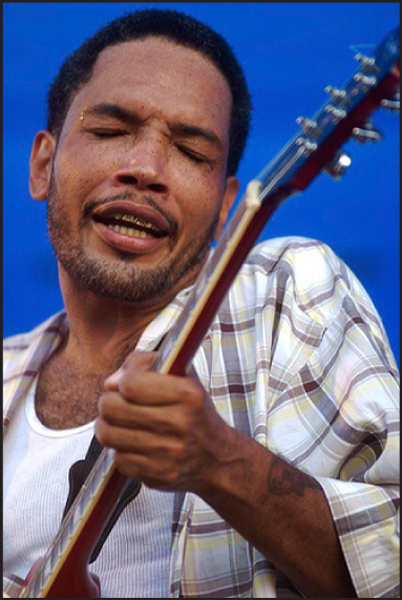 Duwayne Burnside, second oldest son of R.L. Burnside, is one of three Burnsides featured at this year’s festival. Of all the musically-inclined Burnside offspring, Duwayne plays and sings more like R.L. than any of the others. He began playing guitar at a very young age, and around the same time accompanied his father at local juke joints, one of which was owned by Blues legend Junior Kimbrough. Soon Duwayne began playing with Junior in his band, and as soon as he was old enough to “get to Memphis,” he began sitting in with legends such as Albert King, Bobby Blue Bland, and B.B. King. He later played with his R.L.’s band Sound Machine Groove.
Duwayne Burnside, second oldest son of R.L. Burnside, is one of three Burnsides featured at this year’s festival. Of all the musically-inclined Burnside offspring, Duwayne plays and sings more like R.L. than any of the others. He began playing guitar at a very young age, and around the same time accompanied his father at local juke joints, one of which was owned by Blues legend Junior Kimbrough. Soon Duwayne began playing with Junior in his band, and as soon as he was old enough to “get to Memphis,” he began sitting in with legends such as Albert King, Bobby Blue Bland, and B.B. King. He later played with his R.L.’s band Sound Machine Groove.
Duwayne played various instruments on several of his father’s albums, beginning with Bad Luck City (1992). He played bass on Too Bad Jim (1994), and in 2001, the album Raw Electric 1979–1980, consisting of previously un-released recordings made at R.L.’s home near Independence, Miss. periodically from 1979 to 1980, an 11-year-old Duwayne plays the drums. Duwayne collaborated many times with the North Mississippi Allstars, contributing to five of their albums from 2003–2013. Duwayne released two albums of his own—Under Pressure (2005) and Live at the L.A. Mint (2008). The Duwayne Burnside Band currently tours the country, as well as being a local Oxford favorite—drawing huge crowds to Rooster’s Blues House when he plays there.
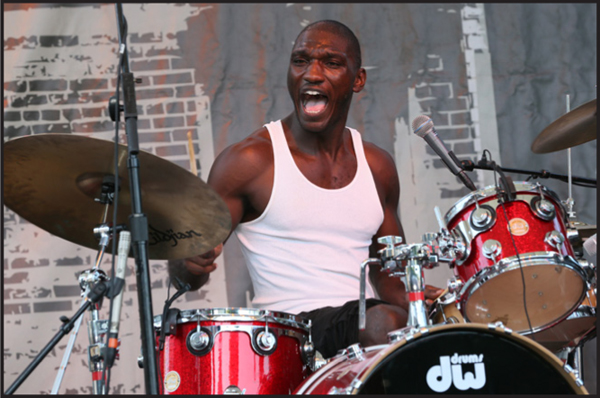 R.L.’s grandson Cedric Burnside grew up immersed in music and playing with R.L. and other family members such as Duwayne, Garry, and brother Cody. Although he can play pretty much any instrument, his main instrument is the drums. Cedric is featured on the North Mississippi Allstars album Shake Hands With Shorty, which was nominated for a Grammy in 2001 for “Best Contemporary Blues Album.” Cedric was nominated again for a Grammy in 2003 for a collaboration called Burnside on Burnside, on which R.L. and Kenny Brown play.
R.L.’s grandson Cedric Burnside grew up immersed in music and playing with R.L. and other family members such as Duwayne, Garry, and brother Cody. Although he can play pretty much any instrument, his main instrument is the drums. Cedric is featured on the North Mississippi Allstars album Shake Hands With Shorty, which was nominated for a Grammy in 2001 for “Best Contemporary Blues Album.” Cedric was nominated again for a Grammy in 2003 for a collaboration called Burnside on Burnside, on which R.L. and Kenny Brown play.
In 2006, Cedric teamed up with Garry and Cody Burnside to form The Burnside Exploration, a group that also featured at times another son of R.L.’s, Dexter Burnside. That same year, the group released their only album, called Burnside Exploration – The Record. Around 2008, Cedric teamed up with Lightnin’ Malcolm to tour and record, which resulted in the album Two Man Wrecking Crew. This album would go on to win the Blues Music Award for “Best New Artist Debut” in 2009. Cedric recently won “Drummer of the Year” for the fourth time at the 2014 Blues Music Awards, has been credited on 15 different albums, and continues to tour the world with his band.
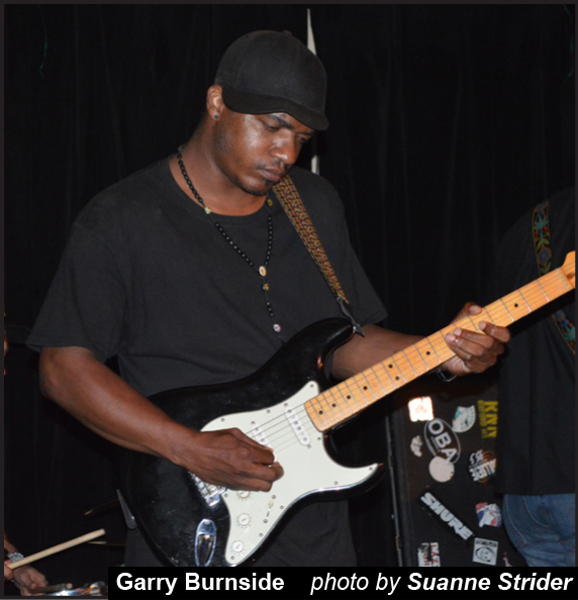 Garry Burnside, the youngest of R.L.’s children, began his music career by playing bass in Junior Kimbrough’s band. From 1992 to 2002 he played bass on six of Kimbrough’s albums. Along with Cedric, Duwayne, and R.L., Garry played on the North Mississippi Allstars album Shake Hands with Shorty, and on the soundtrack to the film 2001 film Big Bad Love.
Garry Burnside, the youngest of R.L.’s children, began his music career by playing bass in Junior Kimbrough’s band. From 1992 to 2002 he played bass on six of Kimbrough’s albums. Along with Cedric, Duwayne, and R.L., Garry played on the North Mississippi Allstars album Shake Hands with Shorty, and on the soundtrack to the film 2001 film Big Bad Love.
Garry started The Garry Burnside Band about two years ago, which has grown into an impressive display of his brilliant interpretation of R.L.’s style mixed with his own more modern, rock-influenced, Hendrix-style of riffing and ripping. I recently attended a Garry Burnside Band show at Proud Larry’s in Oxford. The critically acclaimed Shannon McNally took the stage with Garry’s band, and I cannot describe the show as anything less than magical. Garry is quickly proving himself to be the next great contribution to blues history arising from the legacy of R.L. Burnside.
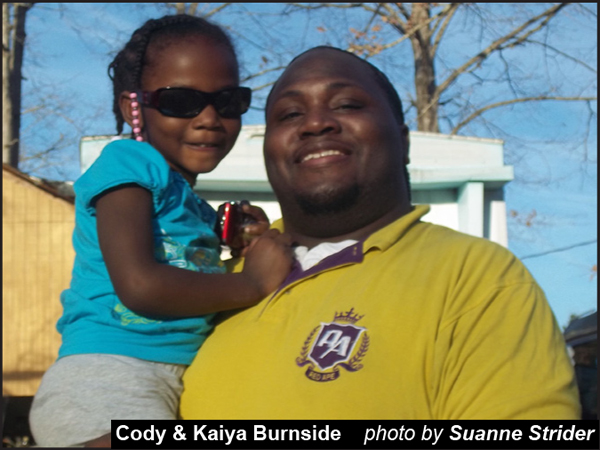 Cody Burnside inherited his Granddaddy R.L.’s talent and was an accomplished musician working on new projects when the Lord found it time to call Cody home. Cody could be called the most unique of all the Burnside musicians because he created a genre all his own, mixing traditional Hill Country Blues with his own style of rap and hip-hop. In 2010, along with Cedric and Garry, he formed the Cedric Burnside Project, which was a mash-up of blues, R&B, Soul, Funk, and Rap. The band toured and recorded with countless music icons such as Bobby Rush, Jimmy Buffett, T-Model Ford, Widespread Panic, among others. Cody was a freestyle rapper, and contributed this talent to two tracks on the John-Alex Mason album, Jook Joint Thunderclap (2001). Cody also collaborated many times with the North Mississippi Allstars on Polaris (2003), Hill Country Revue: Live at Bonnaroo (2004), and Do It Like We Used to Do (2009).
Cody Burnside inherited his Granddaddy R.L.’s talent and was an accomplished musician working on new projects when the Lord found it time to call Cody home. Cody could be called the most unique of all the Burnside musicians because he created a genre all his own, mixing traditional Hill Country Blues with his own style of rap and hip-hop. In 2010, along with Cedric and Garry, he formed the Cedric Burnside Project, which was a mash-up of blues, R&B, Soul, Funk, and Rap. The band toured and recorded with countless music icons such as Bobby Rush, Jimmy Buffett, T-Model Ford, Widespread Panic, among others. Cody was a freestyle rapper, and contributed this talent to two tracks on the John-Alex Mason album, Jook Joint Thunderclap (2001). Cody also collaborated many times with the North Mississippi Allstars on Polaris (2003), Hill Country Revue: Live at Bonnaroo (2004), and Do It Like We Used to Do (2009).
Currently, there is a fundraising campaign in progress to raise money to pay for a memorial headstone to be placed on Cody’s grave. You may contribute by participating in the raffle being held during the picnic, or you may make a private donation by contacting Sara Brown at the following e-mail address: NMSHillCountryPicnic@gmail.com.
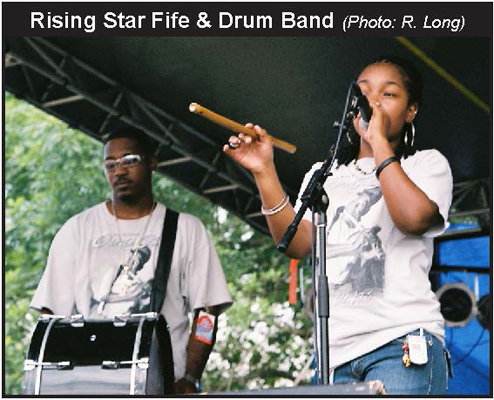 Otha Turner is one of the legendary Hill Country bluesmen to be represented in this year’s lineup by progeny carrying on the family tradition.
Otha Turner is one of the legendary Hill Country bluesmen to be represented in this year’s lineup by progeny carrying on the family tradition.
The Rising Star Fife & Drum Band consists of descendants of Otha Turner, who passed away in 2003 at the age of 95. The band continues to perfect and promote his particular style of blues in which the vocals mimic the “field hollers” that Turner participated in while working in the cotton fields as a young man—a practice that dates back to the African American rural culture of the mid-to-late 1800s. Turner gave to the world a style that has been defined by blues historians as being directly influenced by the tribal style of music originating in Africa, emphasizing the drums as more of a main instrument, accompanied by the fife—typically hand-made, and usually made out of local bamboo or river reeds.
Otha Turner was referred to as the “last surviving master of the Mississippi back-country fife and drum tradition.”
Turner played his music for about sixty years going largely unnoticed by the general public. If not for Fred McFeely Rogers and Luther Dickinson, the world may never have known about the style of North Mississippi Hill Country blues that Turner played. Until 1992, Turner had never been recorded (except for once in an appearance on an episode of Mr. Rogers’ Neighborhood in 1982 performing under the name “Mississippi Fife & Drum Corps”). Luther Dickinson preserved the Otha Turner style of blues on the album Everybody Hollerin’ Goat, which Dickinson recorded and produced from 1992 to 1997. A song from that album called “Shimmy She Wobble” was featured in the 2002 Martin Scorsese film Gangs of New York.
Sharde Thomas, Otha’s granddaughter, plays the fife in the Rising Star Fife & Drum Band, proudly honoring and carrying on the tradition of her grandfather’s art. When her grandfather died, the then twelve-year-old Sharde filled in for her granddaddy to complete his third and final album. She has been carrying the torch for her grandfather ever since.

